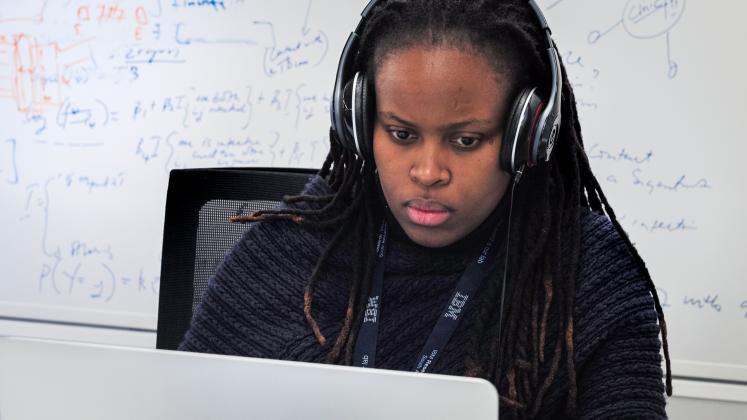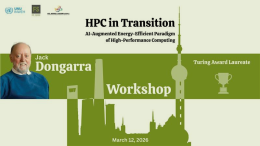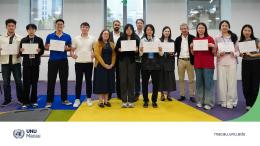As the world hurtles toward an increasingly digital future, the role of artificial intelligence (AI) in shaping the destiny of nations cannot be overstated. South Africa, with its rich tapestry of culture and diversity, could harness AI’s power to better its society, economy, and future.
However, realizing this potential requires a concerted effort from government, industry, and academia to foster innovation, inclusivity, and responsible AI practices. Delays in moving with AI trends and technological advances could be perilous. Lagging is not an option in our current global context.
As Tim Cook, the CEO of Apple, said: “what all of us have to do is to make sure that we are using AI in a way that is for the benefit of humanity, not to the detriment of humanity.”
In recent years, South Africa has made significant strides in embracing AI. With a burgeoning tech startup scene and a growing number of AI-focused research institutions, the country has started to tap into AI’s transformative capabilities.
From health care to agriculture to finance and education, AI applications are already making an impact, promising more efficient processes and better decision-making.
Yet, South Africa must recognize the inequities and inequalities that persistently prevail. Social justice demands that we ensure that advancements occur on all fronts without abandoning the citizens and ensuring that access to the enormous benefits of AI is provided.
What is required is responsible utilization of AI to counter any negative effects, especially in a country with stagnant economic growth.
AI certainly has the potential to catalyze economic growth in South Africa. By automating repetitive tasks, AI can enhance productivity across various industries, leading to cost savings and improved competitiveness.
Moreover, developing and deploying AI solutions can create jobs in areas such as AI development, data science, and AI ethics, fostering a new wave of skilled employment opportunities. Our education systems must be primed to deal with these trends in the job market, where new skills of agility, responsiveness, technical savvy, curiosity and others are embedded in the curriculum.
The graduates of the future need a new wave of skills to ensure that they can adapt to the turbulence of our times. This also extends to the workforce, which will witness monumental changes in their work and need a new form and kind of reskilling.
The way forward
Just a few years ago, we had the Presidential Commission on the Fourth Industrial Revolution (4IR) in South Africa to prepare us for this AI-dominated world, blissfully unaware at the start that the pandemic would hasten this shift. It can be argued that the pandemic propelled the world into new ways of being, working and living. The 4IR is a transformative era characterized by the convergence of digital, physical and biological technologies.
The 4IR Commission of South Africa involved the government, private sector and academia working together to develop and implement 4IR strategies.
In 2020, as we began to see AI’s role, we made eight recommendations. These recommendations can be viewed within the context of AI:
- Educate South Africa on AI
- Establish the national AI institute
- Use AI to reindustrialize South Africa
- Develop a data institute to advance AI application
- Incentivize the adoption of AI
- Build AI infrastructure
- Educate lawmakers on AI
- Develop implementation capacity
South Africa has made some strides in its 4IR journey, with notable achievements in various areas. In terms of infrastructure development, South Africa is investing in critical infrastructure, such as broadband connectivity, data centres, and high-performance computing facilities.
On skills development, initiatives like the Youth Employment and Skills Development Initiative (YESD) and the National Artisan Development Institute (Nadi) are focused on developing the skills needed for the 4IR workforce.
On innovation and entrepreneurship, South Africa is fostering an innovation ecosystem, supporting startups and SMEs in developing 4IR-driven solutions. South Africa has established the National AI Institute jointly hosted by the University of Johannesburg (UJ) and the Tshwane University of Technology (TUT).
However, there is more to be done.
First, South Africa must prioritise education through a lens of inclusivity. In a country like South Africa, where social exclusion was the norm, the transformative power of education is a powerful force. The public good that can be derived from appropriate investments in education is an undeniable fact.
Some countries worldwide have galvanized the education sector and marshalled funds to invest with significant returns on the investment, which have benefitted the country and individuals. Investment in STEAM (science, technology, engineering, arts and mathematics) education, especially in underserved communities, is crucial.
By providing access to AI education and training, we can empower individuals with the skills needed to participate in the AI-driven job market of the future, reducing economic disparities. We are clearly at the juncture where a significant reorientation of education is required if South Africa is to participate positively in shaping the future.
Second, it is wholly necessary to promote AI for social good. South Africa should leverage AI to address some of its pressing societal challenges. For instance, AI-powered health-care solutions can help improve the quality of medical services and extend access to remote areas.
In agriculture, AI can enhance crop yields and food security. AI-driven education tools can personalize learning experiences, making education more accessible and practical. Analytics can enable the customization of education, pacing learning, intervening when required and ensuring student support. For example, chatbots can provide instant support and meet student needs in real-time.
Third, increase collaboration and investment: South Africa must encourage government, industry and academia collaboration to accelerate its AI journey. Public-private partnerships can drive research and development, promote innovation, and attract investment. Government incentives and policies that foster AI adoption and industry-led initiatives can create a thriving AI ecosystem.
Fourth, invest in education and skills development. The government and private sector must invest in skilling and reskilling initiatives to prepare the workforce for the evolving demands of the AI-driven economy. Investing in education and training programmes must prepare the South African workforce for an AI-driven future.
This includes updating curricula in schools and universities to incorporate AI and machine learning and providing vocational training to help workers adapt to new job requirements. Several universities in South Africa offer courses and programmes in AI. For example, the University of Pretoria, the University of Cape Town, the University of Stellenbosch, the University of the Witwatersrand, the University of Johannesburg, North-West University and Nelson Mandela Metropolitan University offer programmes that cover topics such as machine learning, deep learning and natural language processing. It is thus essential to extend these programmes to previously disadvantaged universities.
Fifth, tackle brain drain. Brain drain is particularly concerning for South Africa, where AI talent drives innovation and economic growth. At the University of the Witwatersrand and the University of Johannesburg, I supervised 38 PhDs and 46 master's degree theses in AI. Of the 38 PhDs, 24 have left South Africa, and of the 46 master's degree graduates, 24 have left the country.
Several factors contribute to the AI brain drain in South Africa, including economic opportunities, research infrastructure and resources, and perceived quality of life.
To address the AI brain drain in South Africa, we need to enhance economic opportunities, invest in research infrastructure including advanced computing resources, specialized software, and research facilities; promote AI education and training, create a supportive AI ecosystem and leverage the diaspora to facilitate knowledge transfer, collaboration and potential return of AI professionals to South Africa.
Sixth, increase AI funding by leveraging private-public partnerships. AI funding in South Africa is gaining momentum, driven by government initiatives, private-sector investments, and international support.
For example, the Department of Science and Innovation provides funding for AI research through programmes like the National Research Fund and the Innovation Hubs. Furthermore, the Industrial Development Corporation supports AI startups and SMEs through its Technology Innovation Fund. The South African National Foundation Research Facility also funds AI research through its High-Performance Computing (HPC) facility, Lengau.
By leveraging private sector funding, South African companies should invest in AI to improve operations, enhance customer experiences, and develop new products and services. These investments are fueling the growth of AI startups and attracting venture capital funding.
For example, Naspers, a South African multinational technology company, has invested in AI startups through its Naspers Foundry and Prosus Ventures initiatives. Furthermore, MTN has established a dedicated AI unit and invested in AI startups through its MTN Group Fintech Innovation Hub. Standard Bank has invested in AI to improve risk management, fraud detection, and customer service.
Seventh, invest in data-gathering infrastructure. South Africa’s data-gathering infrastructure is developing rapidly, driven by the growing demand for data-driven insights and innovation. The government, private sector, and academic institutions are investing in various initiatives to enhance the capabilities of data-gathering infrastructure.
The South African government has recognized the importance of data-gathering infrastructure for national development and has launched several initiatives to support its growth. The National Spatial Data Infrastructure aims to establish a comprehensive framework for collecting, managing, and sharing spatial data in South Africa.
The Integrated Statistical Information System provides a unified platform for accessing and analysing statistical data from various government sources. The Open Data Initiative makes public data accessible through initiatives like the Open Data Portal.
South African companies also invest in data-gathering infrastructure to improve operations and gain competitive advantages. These initiatives include telecom companies which are expanding their data networks and investing in data analytics platforms to provide insights for customer behaviour and network optimisation.
Furthermore, banks and insurance companies leverage data-gathering infrastructure to assess credit risk, develop personalized financial products, and combat fraud. Additionally, retail chains use data analytics to understand customer preferences, optimize product placement, and enhance marketing campaigns.
South African universities are researching and developing innovative solutions to improve data-gathering infrastructure. For example, the University of Pretoria is developing new algorithms for data collection and processing from Internet-of-Things devices. The University of Cape Town and University of Johannesburg are researching data privacy and security techniques for protecting sensitive information in data-gathering environments.
Eighth, invest in computational infrastructure. South Africa has made significant strides in HPC, establishing itself as a regional HPC infrastructure and research leader. The Centre for High-Performance Computing (CHPC) is pivotal in this advancement, providing world-class HPC resources and expertise to support scientific research and innovation across various sectors.
The CHPC, established in 2007, is a national facility funded by the South African Department of Science and Innovation. It operates a petascale supercomputer named Lengau, capable of performing over 1.5 petaflops (1.5 quadrillion floating-point operations per second) and is ranked among the top 500 supercomputers worldwide. Lengau is complemented by a GPU cluster and parallel Lustre storage, providing a comprehensive HPC environment for researchers.
The CHPC’s impact extends far beyond providing computing resources. It actively supports the development of HPC skills and expertise through training programmes and workshops, fostering a vibrant HPC community in South Africa. The CHPC collaborates with international partners to advance HPC research and development, contributing to global knowledge and innovation.
South Africa stands at a crossroads with the opportunity to harness the power of AI to transform its economy and society positively. To achieve this, the nation must invest in education, promote inclusivity, and develop robust ethical frameworks. By doing so, South Africa can unlock its true potential and become a leader in AI-driven innovation on the African continent.
The time to act is now, and the benefits of embracing AI are too significant to ignore. The promise of a brighter future is not a dream. It only becomes an impossible mission if no action is taken.
This article was first published by Daily Maverick. Read the original article on the Daily Maverick website.
Suggested citation: Tshilidzi Marwala. "The Perils of Acting Too Slowly in Embracing Artificial Intelligence," United Nations University, UNU Centre, 2023-11-30, https://unu.edu/article/perils-acting-too-slowly-embracing-artificial-intelligence.






